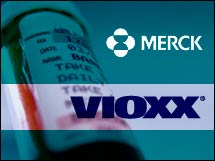|
Merck and the Vioxx rut No. 2 U.S. drugmaker works to balance legal fights, patent loss with strong pipeline. NEW YORK (CNNMoney.com) -- Merck's stock price is starting to climb out of its hole this year, but the drug giant still faces a long uphill climb fraught with obstacles if it ever plans to get to its pre-Vioxx scandal levels. Merck's (up $0.19 to $36.62, Charts) stock price gained more than 14 percent year-to-date through June 30, far outpacing the gains of drug industry as a whole and the S&P 500, which each rose 1.8 percent. Compare this to the market leader Pfizer (up $0.11 to $23.58, Charts), which has seen its price climb less than 1 percent year-to-date.
Merck's gain isn't too shabby, considering the company's stock plunged nearly 27 percent on its Day of Infamy -- Sept. 30, 2004. That's the day America's no. 2 drugmaker pulled Vioxx, an arthritis painkiller, off the market, following a study that linked the drug to increased risks of heart attack and stroke. This has since been a major concern for the company, which not only lost $2.5 billion in annual sales but now faces about 11,500 Vioxx-related lawsuits. But despite Merck's impressive stock price gain this year, the price is still 19 percent below its level on Sept. 29, 2004 - the day before the word "Vioxx" became synonymous with "lawsuit." There might be enough good news to balance out the bad. Merck's 2006 gains have been driven by pipeline break-throughs with the cancer vaccine Gardasil and the diabetes drug Januvia, as well as a strong dividend yield of 4.2 percent, said Al Rauch, analyst for A.G. Edwards & Sons. "You buy good companies when they're having a tough time, and with these dividend yields you get paid while you wait," said Rauch. But Rauch, who rates Merck a "neutral," said the company faces serious obstacles going forward, including the Vioxx-related lawsuits and a slew of patent expirations that are evaporating billions of dollars in annual revenue. Merck bid adieu on June 23 to its patent for cholesterol-cutting drug Zocor, which totaled $4.4 billion in 2005 sales. This opens the drug up to generic competition, resulting in plummeting sales. But the company plans to curb the ensuing plunge with a partnership. Merck and Schering-Plough (up $0.14 to $19.17, Charts) have combined Zocor with the Schering drug Zetia for the drug-combo Vytorin that totaled $2.4 billion in 2005 sales. But Rauch said that Merck faces serious challenges in its patent expirations on other top-selling drugs: Folsom, the $3.2 billion treatment for post-menopausal osteoporosis, is going off-patent in 2008; Cozaar, the anti-hyperintensive drug worth $3 billion in annual sales when grouped with Hyzaar, off-patent in 2010, and Singulair, the $3 billion treatment for chronic asthma, off-patent in 2012. But help is on the way. Merck recently received approval from the Food and Drug Administration for two vaccines - Gardasil, to prevent the sexually-transmitted virus that causes most cases of cervical cancer, and Zostavax, for the prevention shingles - as well as the diabetes drug Januvia. Analysts project comparatively modest annual sales of $300 million for Zostavax, but $1 billion for Januvia and up to $4 billion for Gardasil. "We have high expectations for Gardasil," wrote Tim Anderson of Prudential Equity Group in an analyst's note, where he said vaccine sales could be fueled by routine vaccination in girls as young as 11 and 12. Anderson projects annual sales of $3.2 billion by 2010. But even with these new drugs, Merck will have to scramble for more blockbusters to fill the impending sales gap while maintaining enough growth to keep investors happy. "The big thing that's really holding it back is generic competition," said Rauch, noting that the company will have a difficult time keeping its pledge of double-digit growth, considering that half its revenue is disappearing between 2006 and 2012. "That's a lot of revenue you have to come with." Rauch does not own shares of Merck stock but A.G. Edwards does have investments in the company. Anderson, or someone in his team or family, owns shares of Pfizer. |
|

